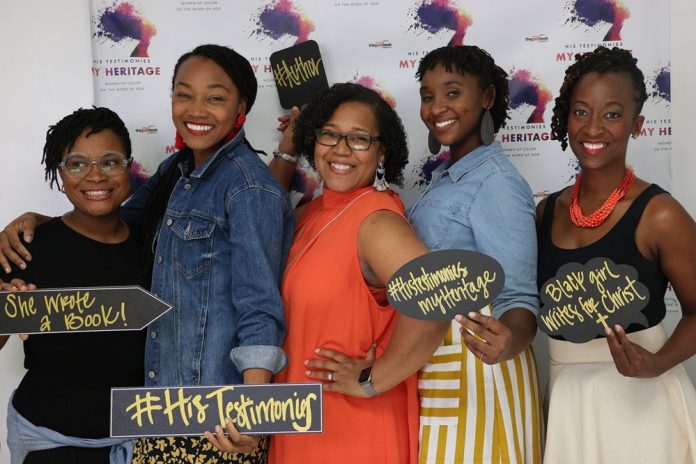Listening to the voices of those not always heard through the exposition of the timeless Word of God is the heart behind editor Kristie Anyabwile’s book “His Testimonies, My Heritage.”
The book brings together a historic collaboration of women of color expositing the Word of God while sharing their personal experiences and how the Bible shapes their stories, past and future.
Contributors include spoken word artists Jackie Hill Perry and Quina Aragon, authors and speakers Trillia Newbell, Elicia Horton, Danielle Anderson, K.A. Ellis and others.
Each chapter explores themes ranging from personal hurt, pain and fear to rejoicing and hope paired with expositional devotional teachings through Psalm 119.
Taking the Psalm stanza by stanza, the authors tell their stories through the lens of God’s story seen in the words of David.
Anyabwile said the motivation for the book’s examination of Psalm 119 was the passage’s focus on the actual Word of God.
“It’s [Psalm 119] so multi-faceted,” she said. “It offers blessing for people who walk according to The Word, it comforts those who suffer, it’s our refuge in times of trial, it gives us cause to praise God for the nature of His Word and it just speaks to every person in any circumstance so it’s needed now because the Word of God is always needed.
Voice for the unheard
Contributor Elicia Horton emphasized the need of a book that specifically highlights the voices of women of color.
Conference speaking slots and awards given for writing and publishing do not leave a large space for women of color — a fact that makes His Testimonies, My Heritage a vitally important work, Horton said.
“We’re all expositing Psalm 119, we’re all highlighting the Word of God and its authority and its power,” Horton said, “but we are also actually being able to share our narrative, what it means to us, why as women of color we’re coming from this vantage point and being able to share with so many people that would never hear from a woman of color had they not picked up this book.”
Quina Aragon echoed Horton’s sentiment regarding the presence of women of color in publishing contracts and at conferences.
“There tends to be that disparity, so for there to be a book that highlights women that a lot of people don’t know about, allows for them — the writers themselves — and the audience to really receive from the people that are maybe outside the typical authors they listen to,” Aragon said.
Contributor Danielle Anderson said the book gave the authors an opportunity to share their stories freely, for their own benefit and that of others.
It’s hard to grow in ethnic unity, Anderson said, without actually listening to those with a differing voice.
“The voices that can often dominate spaces in our culture, are those of white males,” Anderson said. “But how beautiful to give ear to the truths of those often marginalized, women of color.”
When one portion of the body of Christ is suffering, the whole body suffers, Anyabwile said, adding that many women of color suffer as their voice is not heard and as they see no one in communication channels that they can relate to who are identifying similar experiences.
Horton agreed, saying “We’ve had to fight for not only ourselves but for people like us to be seen and to be heard. We’ve been in these spaces where we’ve been overlooked and looked down upon. To feel that even within the evangelical world has been very hard.”
But this book is part of the steps to open doors and march onward in the work God has laid out, Horton said.
“This type of project can be a part of the small steps that God will continue to use to open ears, open hearts, open eyes and help people to understand others from different upbringings and backgrounds,” Horton said. “We have a unique story — we all have a story — because it’s part of God’s bigger story, and we can continue to work together to bring about His good on this side of eternity.”
Diversity of perspectives
Anyabwile noted that many times Christians may not even realize the diverse individuals who are available to be heard.
Majority culture can risk becoming so accustomed to a singular perspective being ingrained into society that many times it goes unnoticed causing the same anecdotes and perspectives to be constantly put forth, creating a narrow viewpoint, she explained.
“The book is needed now just to broaden our perspective and to give us an opportunity to learn from people who are not like us,” Anyabwile said. “The church needs to see that there are women of diverse backgrounds sitting right next to us in the pews every week and that we need to be seeking them out and learning from them.”
Aragon said the global body of Christ always benefits from a diversity of voices, but historically many voices have come from one cultural perspective and background.
“We tend to miss out on a lot of wider diverse, range of voices within the body of Christ,” Aragon said. “At any time when there’s an opportunity for us to listen to someone with a different background, a different heritage, a different culture, coming to the same Word of God that we love and helping us by giving illustrations that come from their background, there’s such a benefit to see beauty of diversity that God has given His multicultural bride, the church.”
Understanding others enables believers to understand the vastness of God and how He providentially works in individuals lives, Anyabwile added.
“We’re always learning from people who are not like us in some way — and that is an enriching experience.” Anyabwile said.
Source: Baptist Press
All Content & Images are provided by the acknowledged source
